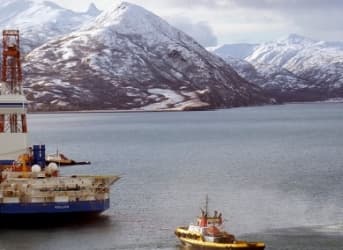The next several months may be pivotal for the future of oil development in the Arctic.
While Russia has proceeded with oil drilling in its Arctic territory, the U.S. has been much slower to do so. The push in the U.S. Arctic has been led by Royal Dutch Shell, a campaign that has been riddled with mistakes, mishaps, and wasted money.
Nearly $6 billion has been spent thus far on Shell’s Arctic program, with little success to date. Now, 2015 could prove to be a make or break year for the Arctic. Shell may make a decision on drilling in the Chukchi and Beaufort Seas by March 2015. If it declines to continue to pour money into the far north, it may indefinitely put Arctic oil development on ice (pun intended).
The crossroads comes at an awful time for Shell. Oil prices, hovering around $60 per barrel, are far too low to justify Arctic investments. To be sure, offshore drilling depends on long-term fundamentals – any oil from the Arctic wouldn’t begin flowing from wells until several years from now. That means that weak prices in the short-term shouldn’t affect major investment decisions.
Related: Is The Arctic Dream Dead?
Unfortunately, they often do. Just this week Chevron put its Arctic plans on hold “indefinitely,” citing “the level of economic uncertainty in the industry.” Chevron had spent $103 million on a tract in the Beaufort Sea in Canadian waters, but weak oil prices have Chevron narrowing its aspirations.
This development is illustrative of the predicament facing major oil companies. They need to spend billions of dollars now to realize oil output sometime next decade. However, they also must conserve cash in the interim. Oil companies across the world are slashing spending in order to shore up profitability.
And Arctic oil is expensive oil, some of the most expensive in the world. It is on the upper end of where prices need to be in order to be profitable. By some estimates, oil prices would need to be in the range of $80 to $90 per barrel for Arctic oil to breakeven; other estimates say as high as $110 per barrel.
That means that even before the oil price drop, Arctic oil development looked tenuous. Statoil and ConocoPhillips had already scrapped their plans to drill in the Arctic, even when oil prices were nearly double where they are now, because of high costs. And when oil prices drop, these marginal projects get the ax.
Shell is now the only one left standing, still mulling its next move. Shell’s CFO said during a conference call on October 30 that the company is “planning and hoping” to drill in the Arctic in 2015.
Despite Shell’s perseverance, it is facing some significant obstacles, several of which, are out of the company’s control.
Shell is awaiting a court decision on the 2012 approval by the federal government of Shell’s oil spill response plan, which environmental groups have sued to invalidate. There are other regulatory hurdles as well. The Bureau of Ocean Energy Management still has to approve Shell’s drilling plans. And BOEM also has to finalize the revised environmental assessment, one that revised upwards the chances of an oil spill, potentially complicating regulatory approvals. These events must be completed before Shell can begin drilling.
Related: Shell Needs Five More Years In The Arctic
The bureaucratic mess threatens to push Shell’s development plans past the expiration date for many of its leases. Seeing the writing on the wall, Shell earlier this year asked for a five-year extension on its leases, many of which begin expiring in 2017.
ADVERTISEMENT
“Despite Shell’s best efforts and demonstrated diligence, circumstances beyond Shell’s control have prevented, and are continuing to prevent, Shell from completing even the first exploration well in either area,” Shell’s Vice President in Alaska, Peter Slaiby, wrote in a letter to regulators on July 10, 2014.
The obstacles are piling up.
According to Platts, a decision on whether or not Shell plans to proceed with drilling in 2015 will be made by March. And if they turn their back on drilling, it could mean closing the doors on the Arctic for years to come.
By Nick Cunningham of Oilprice.com
More Top Reads From Oilprice.com:
- Drilling In ANWR Likely To Resurface If GOP Wins Congress
- Western Sanctions Halt Exxon’s Drilling In Russian Arctic
- Sanctions, Oil Prices Push Russia Into Currency Crisis


















